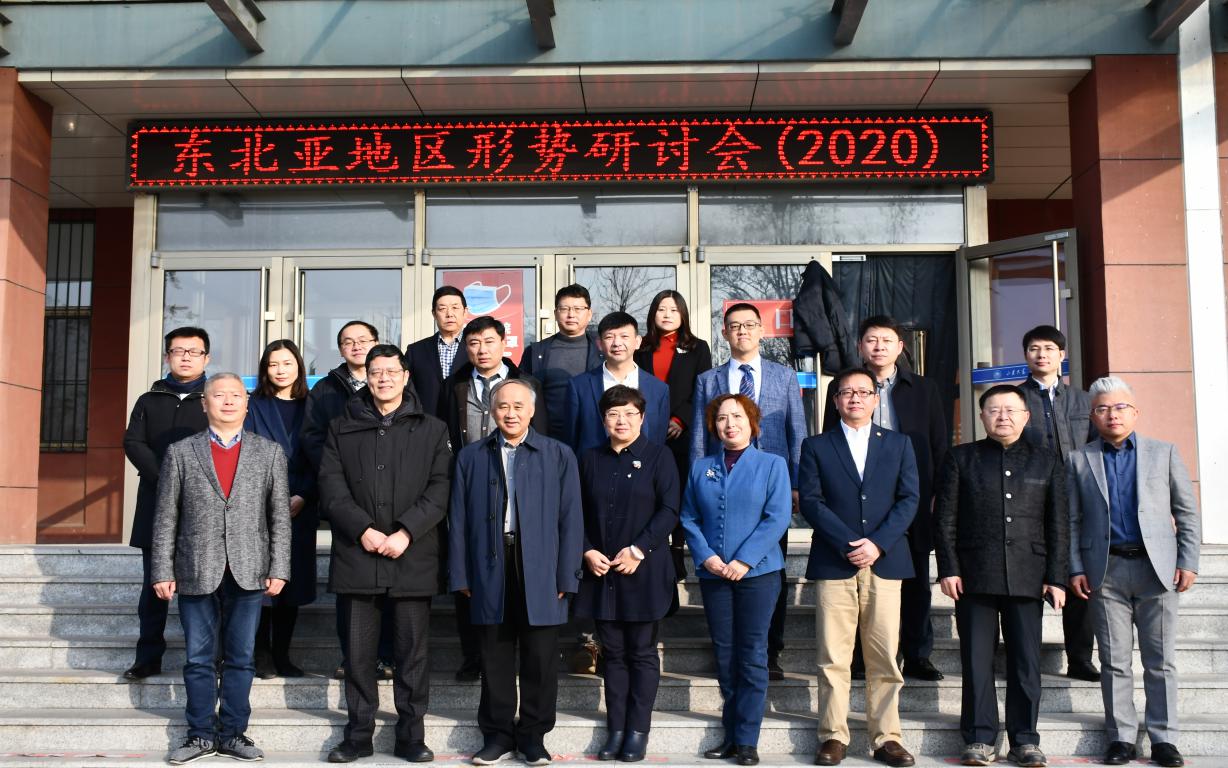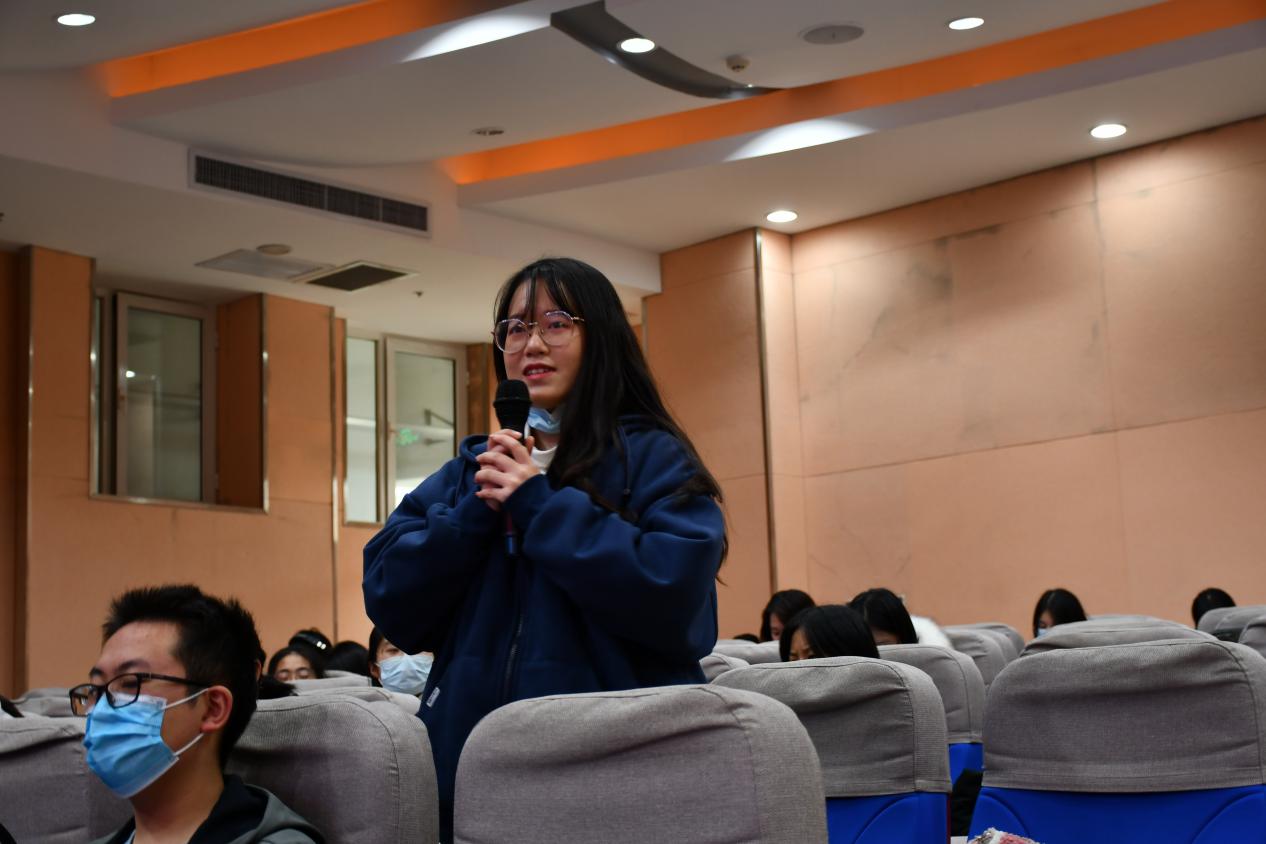On December 12, School of Northeast Asia Studies and the Institute of International Studies hosted Forum on the Current Situation in the Northeast Asian Region (2020). A total of 21 experts and scholars from 15 universities and research institutes in China participated and nearly 600 students attended the forum. The conference has three sessions, taking the form of online plus on-site, and presentation plus discussions. During the meeting, experts and scholars expressed their views on the current situation concerning great power relations, China’s peripheral diplomacy, Northeast Asian regional problems and the Korean Peninsula issues.
The meeting was chaired by Professor Zhang Jingquan, Vice Dean of the School of Northeast Asia Studies and Vice President of the Institute of International Studies. Dean Zhao Yupu, Deputy Secretary of the Party Working Committee of Shandong University at Weihai, delivered a welcoming speech at the opening ceremony. Zhang Yunling, member of the Chinese Academy of Social Sciences (CASS) and President of the Institute of International Studies, gave a keynote speech, summarizing the five “changes” in Northeast Asia from the past to the present and the future.

The theme of the First Session was “Current Great Power Relations and China’s Peripheral Diplomacy”. Xing Guangcheng, member of CASS and Director of the Institute of Chinese Borderland Studies, delivered a speech on the topic of “Russia’s policy adjustment in Northeast Asia”, pointing out the imbalance in Russia’s east-west development and regional cooperation. Yang Bojiang, Director of the Institute of Japanese Studies at CASS focused on the role of the allies during the Biden administration and predicted the situation in Northeast Asia after the 2020 US election. Zhao Minghao, researcher of the Institute of International Studies at Fudan University, talked about the impact of COVID-19 on the Indo-Pacigic Strategy of the US. Professor Yang Luhui, Director of the Institute of Asia-Pacific Studies at Shandong University, spoke on the adjustment of the Northeast Asian orders in the post-pandemic era. Professor Liu Xuelian, Director of the Institute of Northeast Asian Geopolitics and Geo-economics at Jilin University, discussed the need to find a balance point in China’s relations with Northeast Asian countries. Associate Professor Ling Shengli, Deputy Director of the Institute of international Relations at China Foreign Affairs University, gave a speech titled “Northeast Asian Security and the US Factors in 2020”, looking into the future of the security situation in Northeast Asia. Professor Yu Haiyang, Vice Dean of School of Public Administration at Jilin University, delivered a speech titled “U.S.-China relations from the perspective of American think tank: issues, trends and responses”, focusing on America’s threat perception of China, the trend of U.S.-China relations, and the changing views of the U.S. think tank in the post-pandemic era. Professor Zhanxin, Vice Dean of School of Politics and Law at Northeast Normal University, talked about China and the US nuclear arms control. Associate researcher Li Ruoyu from School of History and Culture at Sichuan University talked about Japan’s response to the pandemic based on his own experience in Japan.

The Second Session centered on “Political, Economic and Security Issues in North-East Asia”. Yao Jun, Deputy Director of the Policy Research Office of Shandong Provincial Party Decision-making Advisory Committee Office, gave his opinion on how to build Shandong province into a bridgehead for Northeast Asian integration. Professor Lin Hongyu, Dean of the International School at Huaqiao University, talked about the Game of the big power of Northeast Asia. Researcher Li Kaisheng, Deputy Director of the Institute of International Studies of the Shanghai Academy of Social Sciences, gave a speech on the differences between Biden’s Northeast Asian policy compared with Obama’s. Professor Cui Ge from Center for Asia-Pacific and Global Strategy Studies at Dalian University of Technology talked about economic cooperation between China, Japan and South Korea under the Regional Comprehensive Economic Partnership Agreement. Professor Gong Lili from School of Public Administration at Jilin University talked about building a confidence mechanism for maritime security in East Asia under the perspective of maritime community with a shared future. Associate Professor Wang Xiaoke from Northeast Asian Research Center at Jilin University presented a speech on the “role conflict and the adjustment of South Korea’s policy towards Japan”, analyzing the main contradictions between Japan and South Korea, as well as the impact of American factors on the policy formulation of the two countries.
The Third Session focused on “new developments of the Korean Peninsula issue”. Professor Jiang Longfan, Director of Center for National and Regional Studies at Tianjin Foreign Studies University, gave an assessment of U.S.-DPRK relations during Trump administration and looked into the future prospects of Byden administration’s policy. Professor Wang Xingxing, Director of the Center for Korean Peninsula and Asia-Pacific Strategic Studies at Shanghai Foreign Studies University, analyzed the characteristics of the new US-DPRK-related think tanks, and predicted future U.S. policy towards North Korea. Researcher Li Nan from Institute of American Studies, CASS, believed that US-DPRK relations will continue to develop in the context of Sino-US competition. Li Chunfu, Deputy Director of South Korea Research Center at Zhou Enlai School of Government, Nankai University, believed that the Biden administration’s foreign policy will center on reconstructing the Democratic Alliance to counterbalance China, and regain U.S. leadership in international cooperation against the COVID-19 and climate change. Associate Professor Xu Bo, Deputy Director of the Center for Russian Studies at Institute of Northeast Asian Studies, Jilin University, gave an analysis of the evolution of Russia’s North Korean policy from the perspectives of domestic politics and geo-relations. Associate Professor Piao Dongxun, Director of the Institute of international Politics at Yanbian University, spoke on the topic of “North Korea’s adjustment of foreign policy in the context of COVID-19”.

During the Q&A session, students raised questions on their interested topics and participating experts and scholars actively provided answers. In the end, Professor Zhang Jingquan summarized the forum and stressed the need to grasp the characteristics of the era and combine theoretical research with policy need. The Institute of International Studies and School of Northeast Asia Studies, with the support of scholars at home and abroad, will adhere to the cross-disciplinary approach in talent training and think tank construction, as a celebration of the 120th anniversary of Shandong University as its way of contributing to China’s teaching and research on international issues.